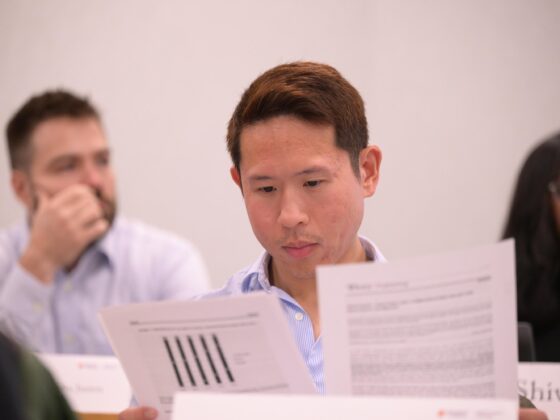Senior Director of Admissions Brett Twitty recently hosted a webinar in which he answered the top 10 questions frequently asked by Executive MBA applicants.
If you missed the session or you simply want to review the conversation, be sure to check out the recording linked below and read on for a few additional insights about our Executive MBA application process.
Watch: Executive MBA Applicant FAQs
As Twitty shares in the webinar, Darden evaluates applications holistically. In other words, everything in your application will matter, but it is also true that different aspects of the application matter differently for different applicants.
As you assemble your materials, think of the application process as a storytelling exercise. Focus on the “Why” of your story and be sure to take full advantage of those opportunities in the application process to demonstrate your values, perspective, voice and personality. Darden is a case method school and our Admissions Committee is focused on getting to know you as a person — after all, you will bring your whole self to the classroom.
We have monthly deadlines to give you maximum flexibility.
In the Executive MBA program, have monthly application deadlines all focused on a single enrollment date of August 2021. We know how busy our applicants are, and, when it comes to applying, we have found that applicants find it helpful to know they have options.
Our general advice is to apply as soon as you feel you can put together a strong application, and if you’ve spent some time with our Deadlines page, you know that things move quickly in the Executive MBA application process. In most rounds, it is typically three weeks from application deadline to decision release and admitted students have about three weeks to consider their offer of admission.
Given this quick turnaround, we recommend doing your research now. Not only will it help strengthen your application. It will also help you move quickly should you receive an offer of admission. Here are three resources (in addition to the Discover Darden blog, of course) that will help you continue to explore the Executive MBA program.
- The ExecMBA Podcast: Weekly conversations with students, faculty and staff
- Application Process Webpage: A step-by-step guide to our Executive MBA application
- General FAQs: Insights about the structure and design of our Executive MBA program
You are applying to our Executive MBA program, not a particular format.
As you likely know, Darden offers two executive formats — Executive MBA (EMBA) and Global Executive MBA (GEMBA) — and both are part of our Executive MBA program. The only curricular difference between the two formats is the amount of required global experience. EMBA and GEMBA format students are part of the same class and and progress through the program together.
Applicants often worry that they have to make a format decision at the time of application. Good news! You do not. When filling out your application, you are applying to Darden’s Executive MBA program. There is a section of our application where you can indicate your format interest, but this field is simply informational and it is not binding in any way. Admitted students are offered their choice formats — either EMBA or GEMBA — and students officially choose their format when paying their deposit and accepting their offer.
So, how do students choose between EMBA and GEMBA? Here are a few things to keep in mind when considering your format options. Fun fact: Over the past few classes we’ve had around 35 to 40 GEMBA format students (out of roughly 135 matriculants).
If you are already thinking you will likely want to do more than one global residency during your program, you should consider the GEMBA format. While it is possible for EMBA students to add additional global residencies for an additional fee (approx. $4200/each), GEMBA format students are guaranteed a trip in each of the four travel periods.
There are up to 12 global residency locations, and for our Class of 2022, the trip destinations span all major continents. For many of our students, the Darden MBA is a terminal degree and their last major educational experience, and they are drawn to GEMBA because it represents the “max” option.
There are also other practical considerations. As noted, the only curricular difference between EMBA and GEMBA students is the number of required global residencies — EMBA students participate in one required, week-long global residency, while GEMBA students participate in four.
In terms of tuition and fees, our GEMBA format is approximately $11,000 more than our EMBA format, and it is worth noting that while the global residency fee captures a great many of the costs related to your participation in the course, expenses like travel to and from the global residency location are not included in this fee.
In addition, when comparing class days out of the office, our GEMBA format is approximately 15 more days over the 21 months of the program. While not a huge difference when spread across the program, every student’s schedule and ability to be out of the office or away from family is different.
Bonus Round: You may be wondering how COVID is impacting the global component of our Executive MBA program? For our Class of 2022, we have rescheduled the global residencies previously slated for February 2021 (Brazil, China and Argentina) to April 2022, and our next travel period is not until June 2021 (followed by October 2021 and February 2022). We are hopeful that with time the overall situation will improve and we will be able to travel again, but our Program team is monitoring the situation closely, and, as previously noted, the health and safety of our students, faculty and staff is our number one priority.
It is also worth noting that the Executive MBA Class of 2023, the class for which we are currently recruiting, will not travel until February 2022, with trips offered every four months thereafter (June 2022, October 2022 and February 2023).
Unofficial transcripts and self-reported test scores are just fine for the purposes of our application process.
An unofficial transcript is a transcript that is issued directly to you from the institution. What does this look like? Potentially many things! It could be an electronic download, a PDF, an actual physical transcript or a photo of a transcript. In our application process, you will be asked to upload these materials to your application, so be sure you have an electronic version close at hand.
We accept a number of standardized tests in our Executive MBA application process, including the Executive Assessment, GMAT, GRE, MCAT and LSAT, and we will even accept older or expired test scores. If you submit test score(s) with your application, you will also need to self-report your score breakdowns for all valid test scores. If you are submitting an older or expired test score, you will need to submit your score breakdown with your application materials.
If you are admitted and decide to accept your offer, you will be asked to submit official transcripts from all degree-granting institutions as well as official test score reports for any standardized tests prior to matriculation. What is an “official” transcript? An official transcript is a transcript issued directly from the institution to our office.
The next application deadline to join the Class of 2023 is 10 November. Work on your application.
Applying in our November round? Join Senior Director of Admissions Brett Twitty on Friday, 6 November for an Application Hotline webinar. Register.
Be sure to consult the Latest News regularly for the most updated news releases and media hits. Check out faculty thought leadership published on Ideas to Action. And stay connected with us via social media: Facebook, Instagram, LinkedIn, Twitter, WeChat





